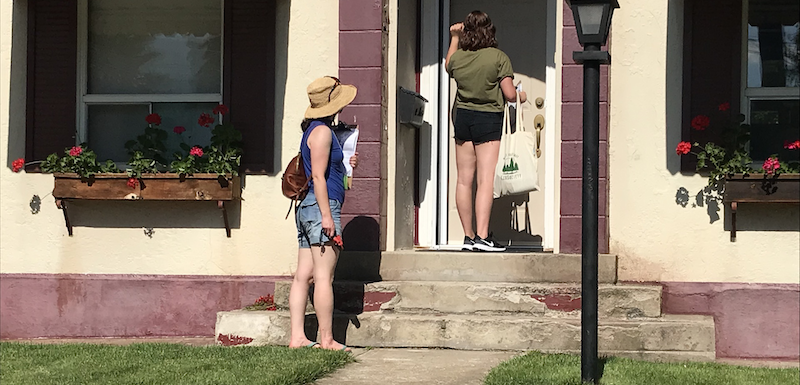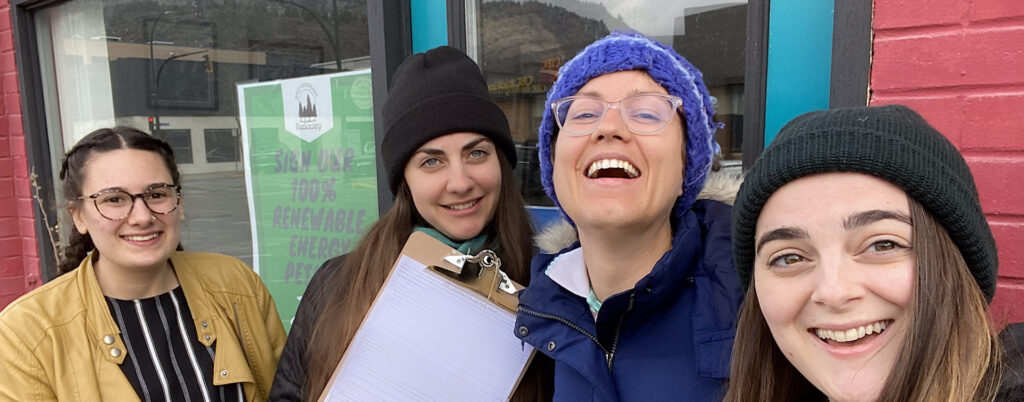The Best Way to Deliver Climate Action?

“Neighbours United” teaches us that minds can be changed with “Deep Canvassing”
by Clean50 Executive Director, Gavin Pitchford
Trail BC, is not a community where the climate crisis and net-zero energy / renewable energy was ever front and centre. Over 1,400 of the total population of ~7,900 are employed by a Teck Resources lead / zinc smelter, and comparatively few of the residents have post secondary educations, compared to the rest of BC – and it’s been that way for over 125 years. Most residents had long-viewed any attempts to drive an environmentally focused agenda as clearly contrary to the community’s interests. Others were keen on change.
So what’s in the water that drove the residents of Trail to resolve that division, and urge their city council to embrace a renewable energy future that committed the community to move to exclusively to renewables?
The group formerly known as the West-Kootenay EcoSociety – Now “Neighbours United”!
After knocking on every door in town, and then succeeding in having almost 1200 deep canvass conversations, the public narrative shifted. Ultimately, residents called upon city council to pass a resolution pledging to transition to 100% renewable energy across community energy use by 2050 – because post canvassing, enough of Trail’s residents were no longer conflicted – they wanted – and then demanded – a clean energy transition.
Research shows that the impacts of deep canvassing are profound: A full one third of deep-canvassed households change their perspectives. Using deep canvassing as a core campaign strategy works to change community conversations for the long term
Montana Burgess, Executive Director, Neighbours United
The Neighbours United organization has now persuaded communities across the region to commit to a renewable energy future for what is the largest geographical region by area in North America: The Kootenays. In addition to Trail, the cities of Castlegar, Rossland, Nelson; the Towns of Golden and Creston; the Villages of Slocan, Warfield, Fruitvale, Silverton, New Denver & Kaslo; the Regional District of Central Kootenay, and the Regional District of Kootenay Boundary, have all committed to transition to 100% renewable energy no later than 2050 across all community energy uses.
If it worked in Trail, it could work pretty much anywhere. And Neighbours United has grown since, to prove just that.
Historically, with more ambition than funding, and heavily reliant upon recruiting and training local volunteers, the organization has still, and improbably, been able to scale to lead campaigns targeting the eco-transformation of resource driven communities across Canada and now into the United States.

The deep canvassing approach is very much oriented to having volunteer canvassers meet targeted households “where they are”. Canvassers share their own personal concerns – often aligned with those of their neighbours, and find common ground to then combat misinformation and persuade their neighbours to take another look at more sustainable alternatives.
Research shows that the impacts are profound: a full one third of deep-canvassed households change their perspectives. Using deep canvassing as a core campaign strategy works to change community conversations for the long term.
For example, Executive Director (and Clean50 Emerging Leader from 2022) Montana Burgess shared with me that her personal motivation in driving change in the West Kootenays was initially closely tied to local pollution and its measurable impacts upon her own child’s health. Sharing that personal information when knocking on doors helps open the conversation with neighbours whose own children or grand-children might already be – or might become – similarly impacted. And the personal connection turns conversations from an “us versus them” vibe into a conversation wrapped around shared values and a shared desire that all children grow up in a healthy environment.
In Canada, Neighbours United is presently leading a campaign in Newfoundland and Labrador to persuade residents to push for an end to further gas and oil exploration in the province and off-shore. The group partnered with Alberta Talks to build support for ending tax breaks to oil and gas companies in key Calgary suburban neighbourhoods in the lead up to the 2023 election.
The proven effectiveness of these campaigns has led to Neighbours United sharing their learnings and emerging best practices. They are regularly running customized trainings for groups across the continents, and over the past two years, have had more formal partnerships and trained groups in rural, small town, and suburban communities to effectively use deep canvassing to build support for clean energy in their campaigns. For example, working with Ohio Citizen Action to stop the spread of dis and misinformation to get solar farms built across Ohio in rural counties, training them to use deep canvassing to resolve the misinformation and build support.
A rural county in Michigan has the opportunity to revive manufacturing with the prospect of a semiconductor advanced manufacturing site. Neighbours United trained a local group, Rural Michigan Action Alliance, to have conversations in this divided community to identify community benefits and overcome misinformation.
But predictably, all of this takes not just volunteers – but the staff and the money to train them.
And if you share some of yours, Neighbours United promises to use it to make a meaningful difference – and with more money, at a rate more in keeping with the urgency of the moment – and in more than a few communities at a time!
If you’re interested in lending a hand, please join me to support Neighbours United here.
When you do, it would be great if when asked if the gift is in honour or memory of someone, you answer with “Yes” and then choose “In Honour of” and add the “Clean50”.
Full Disclosure – Clean50 Executive Director Gavin Pitchford has recently agreed to serve as a member of the Board of directors of Neighbours United. In that capacity he promises to hold leadership accountable for frugal and effective use of all donations.














